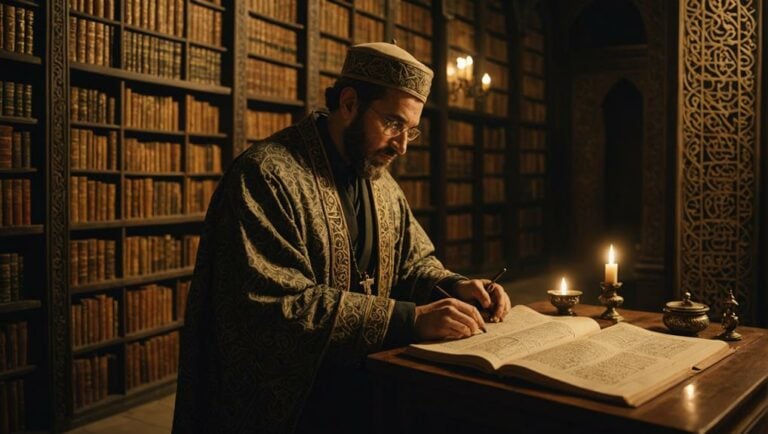Islamic scholars, through the Translation Movement, preserved and expanded ancient Greek, Persian, and Indian knowledge, playing a pivotal role in medieval science.
Discover how their collaboration at the House of Wisdom in Baghdad influenced the Renaissance and continues to impact modern fields like astronomy and medicine.
The Translation Movement
The Translation Movement, initiated by Islamic scholars, played a pivotal role in preserving and disseminating ancient Greek, Persian, and Indian knowledge. By translating these texts into Arabic, Islamic scholars made certain that critical scientific, philosophical, and mathematical works weren't only preserved but also made accessible to a broader audience.
This movement wasn't just about translation; it was about understanding and expanding upon this knowledge. Key figures like Al-Kindi, Al-Haytham, and Al-Khwarizmi were instrumental in these efforts. Al-Kindi, often called the 'Philosopher of the Arabs,' translated numerous Greek works, making significant contributions to philosophy and science.
Al-Haytham's work in optics, based on Greek foundations, revolutionized the field, while Al-Khwarizmi's translations of mathematical texts introduced algebra to the world. Arabic became the lingua franca for scholarly communication, bridging diverse cultures and facilitating intellectual exchange.
This common language allowed for the spread of these translated texts across the Islamic world, fostering a rich environment for further innovation and study. The Translation Movement laid the foundation for the Islamic Golden Age, highlighting the critical role of Islamic scholars in preserving and enhancing ancient knowledge.
The House of Wisdom
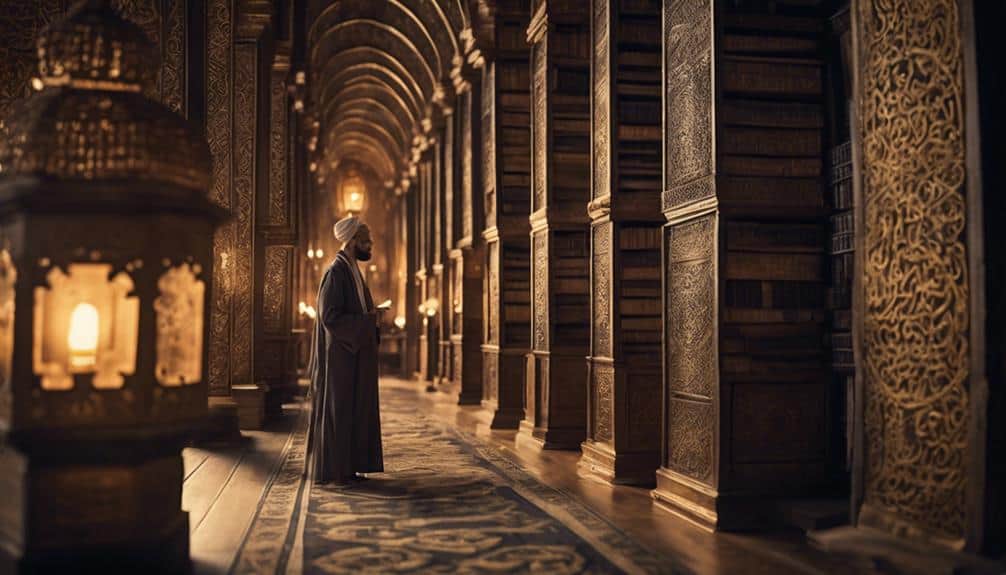
Building on the momentum of the Translation Movement, scholars flocked to the House of Wisdom in Baghdad, a premier center of learning and intellectual exchange during the Islamic Golden Age. The House of Wisdom wasn't just a library or a university; it served as a vibrant hub where Islamic scholars engaged in rigorous study and discourse. Sponsored by caliphs, this institution facilitated the preservation and transmission of classical knowledge.
Islamic scholars at the House of Wisdom translated a vast array of Greek works, covering fields such as philosophy, mathematics, and science, into Arabic. These translations weren't mere copies; scholars added their own commentaries and interpretations, enriching the original texts. This process made certain that the intellectual heritage of ancient civilizations wasn't only preserved but also expanded upon.
The House of Wisdom also played a pivotal role in translating Persian and Indian texts, making it a melting pot of diverse knowledge systems. By fostering such cultural and intellectual exchanges, it became a cornerstone in the transmission of classical knowledge across the Islamic world and beyond. Consequently, the House of Wisdom significantly contributed to the preservation of ancient knowledge, laying the foundation for future advancements.
Baghdad's Role in Knowledge
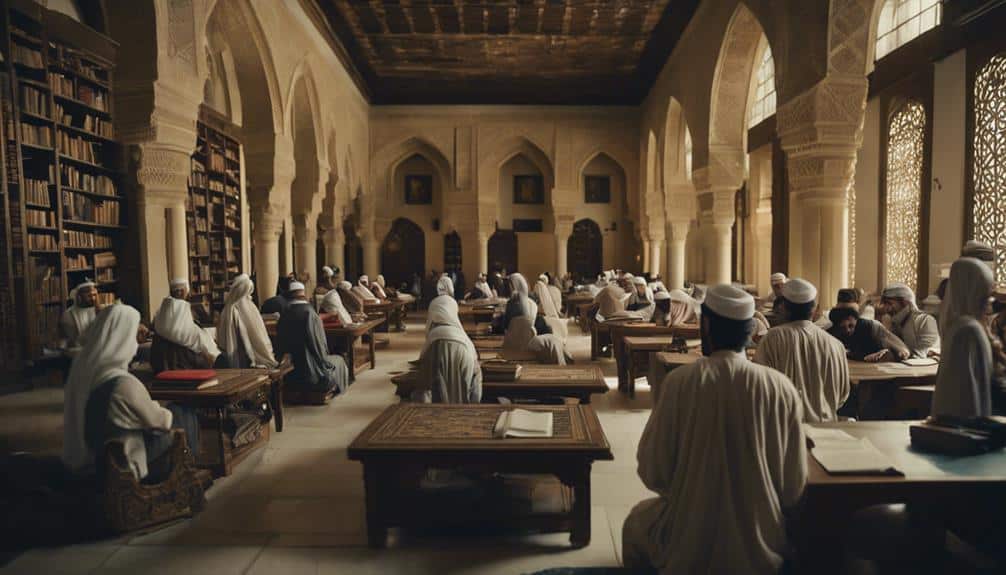
Serving as a nexus of intellectual and cultural exchange, Baghdad played an essential role in the preservation and enhancement of ancient knowledge during the Islamic Golden Age. Islamic scholars from around the world converged on Baghdad, particularly the renowned House of Wisdom, to engage in profound learning and research. This institution acted as a beacon for intellectuals, making Baghdad a central hub for scholarly activity.
Several key factors underline Baghdad's pivotal role in knowledge preservation:
- Translation Efforts: Scholars in Baghdad translated countless works from Greek, Persian, and Indian sources into Arabic, ensuring the survival of ancient knowledge.
- Scholarly Collaboration: The House of Wisdom facilitated unprecedented levels of collaboration among scholars of various backgrounds and disciplines.
- Innovation and Research: With its vast resources, Baghdad fostered an environment where scholars couldn't only preserve but also expand on ancient knowledge.
- Documentation and Dissemination: The knowledge preserved and enhanced in Baghdad was meticulously documented and widely disseminated, influencing intellectual thought across the Islamic world and beyond.
Greek Works Translated
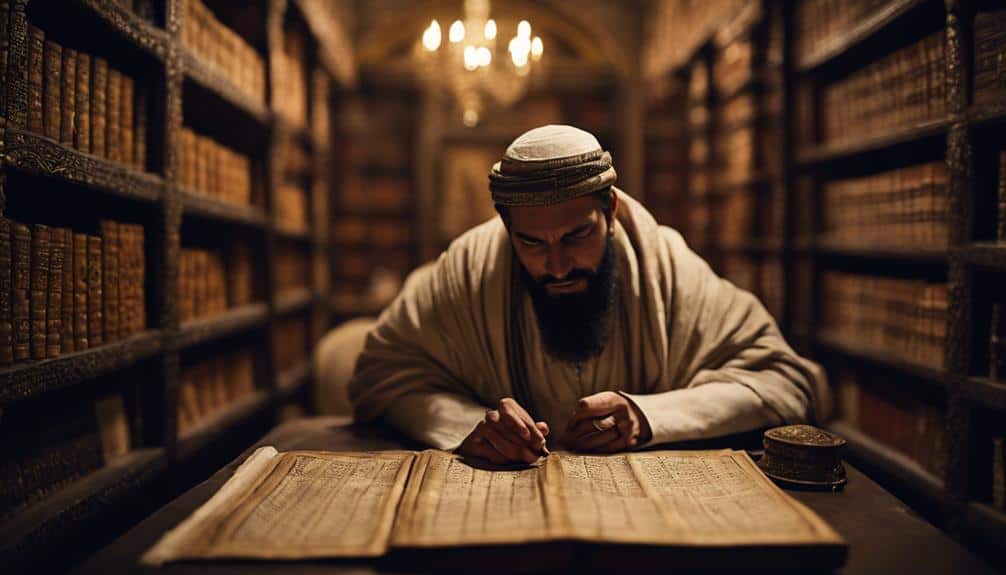
You'll find that the translation of Greek works into Arabic wasn't a solitary effort but rather a collaborative one involving multilingual scholars.
These translations included key scientific texts by Aristotle, Euclid, and Galen, which greatly impacted Islamic science.
Multilingual Scholar Collaborations
In Toledo, multilingual scholars collaborated across cultures and languages to translate Greek works into Arabic, ensuring the preservation and dissemination of ancient knowledge. These Islamic scholars, fluent in Latin, ancient Greek, Arabic, and Syriac, made significant strides in translating and preserving classical texts. The collaborative nature of their work allowed for a rich exchange of ideas and expertise, enhancing the quality and breadth of the translations.
Here's how their multilingual collaboration made an impact:
- Linguistic Proficiency: Scholars' fluency in multiple languages bridged ancient and contemporary worlds.
- Cultural Inclusivity: Cooperation among Christians, Jews, and Muslims fostered a holistic approach to knowledge preservation.
- Knowledge Expansion: The translations spanned diverse fields like biology, geometry, mathematics, medicine, and astronomy.
- Dissemination Techniques: Advances in paper-making facilitated the spread of these translated works across the Muslim world.
Key Scientific Texts Translated
Islamic scholars meticulously translated and preserved seminal works of Greek luminaries like Aristotle, Euclid, and Galen, safeguarding their scientific and philosophical contributions endured through the ages. By translating these key texts into Arabic, they played a pivotal role in sustaining and disseminating ancient scientific knowledge.
The translation movement within Islamic civilization was a monumental endeavor. Scholars systematically translated Greek works on mathematics, astronomy, medicine, and philosophy, making these disciplines accessible to a wider audience. For instance, Aristotle's logical treatises, Euclid's foundational geometrical texts, and Galen's medical writings were all rendered into Arabic with remarkable precision.
These translations weren't mere linguistic exercises; they involved nuanced understanding and interpretation. Islamic scholars engaged deeply with the content, often adding their own commentaries and insights. This rigorous approach guaranteed that the scientific knowledge embedded in these works wasn't just preserved but also enhanced.
The preservation of Greek works was instrumental in transmitting ancient wisdom to future generations. By safeguarding these texts, Islamic scholars created a bridge that connected the ancient world with later civilizations, fostering a continuous flow of scientific knowledge. This meticulous translation effort underscores their vital role in the history of science.
Impact on Islamic Science
By translating Greek works into Arabic, scholars greatly propelled the advancement of Islamic science, leading to groundbreaking developments in fields such as algebra, optics, and medicine. This process of translation did more than just preserve ancient Greek knowledge; it actively integrated it into the intellectual fabric of the Islamic Golden Age.
Islamic scholars didn't merely translate; they expanded upon the foundational ideas presented in Greek texts. For instance, the work of Al-Khwarizmi in algebra, Ibn al-Haytham in optics, and Avicenna in medicine built directly upon the knowledge from Greek sources. Here's how this translation effort had a tangible impact:
- Algebra: Developed further by Al-Khwarizmi, who synthesized Greek and Indian mathematical concepts.
- Optics: Advanced by Ibn al-Haytham, who expanded on Greek theories of light and vision.
- Medicine: Enhanced by Avicenna, who integrated Greek medical texts into his all-encompassing medical encyclopedia.
- Astronomy: Improved through the translation and critique of Greek astronomical works.
Contributions of Diverse Scholars
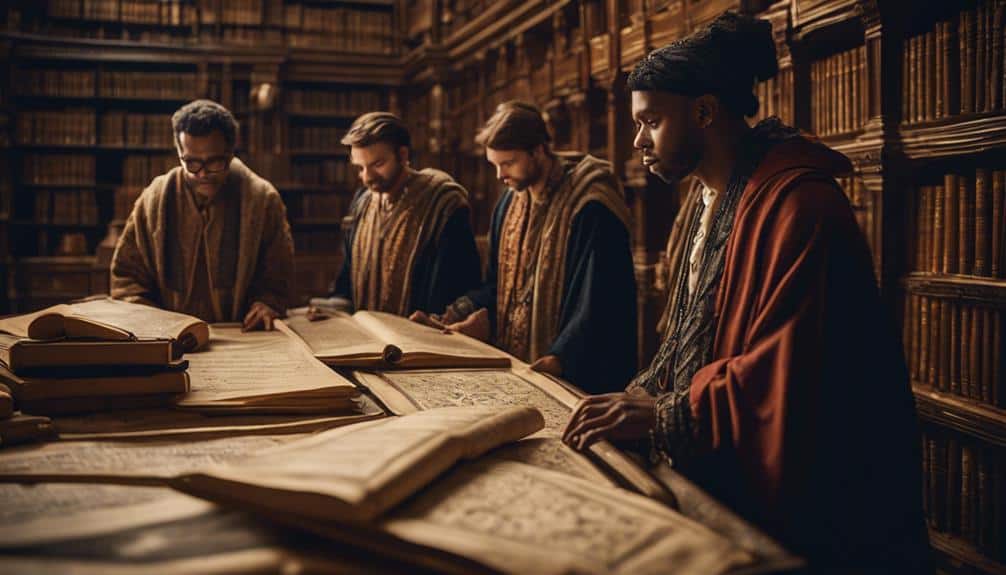
Scholars from diverse religious backgrounds, including Christians and Jews, played a pivotal role in safeguarding ancient knowledge during the Islamic Golden Age through collaborative efforts and state sponsorship. Islamic scholars, alongside their Christian and Jewish counterparts, transcended religious boundaries to work towards the common goal of safeguarding and translating valuable ancient texts. These collaborative efforts led to the transmission and preservation of knowledge that might've otherwise been lost.
By studying and translating works from Greek, Persian, and Indian sources, these diverse scholars enriched the intellectual landscape of the time. Their efforts weren't limited to mere translation; they also provided critical commentaries and enhancements, which further advanced understanding. The spirit of collaboration mirrored the later Toledo School, where scholars from different faiths worked together seamlessly.
This hunger for knowledge and mutual respect among scholars created an environment ripe for intellectual growth. Islamic scholars, motivated by the pursuit of knowledge, recognized the value in the contributions of their diverse peers. These efforts guaranteed that ancient knowledge wasn't only preserved but also expanded upon, influencing subsequent generations and laying the groundwork for future scientific and intellectual advancements.
State Sponsorship of Scholars
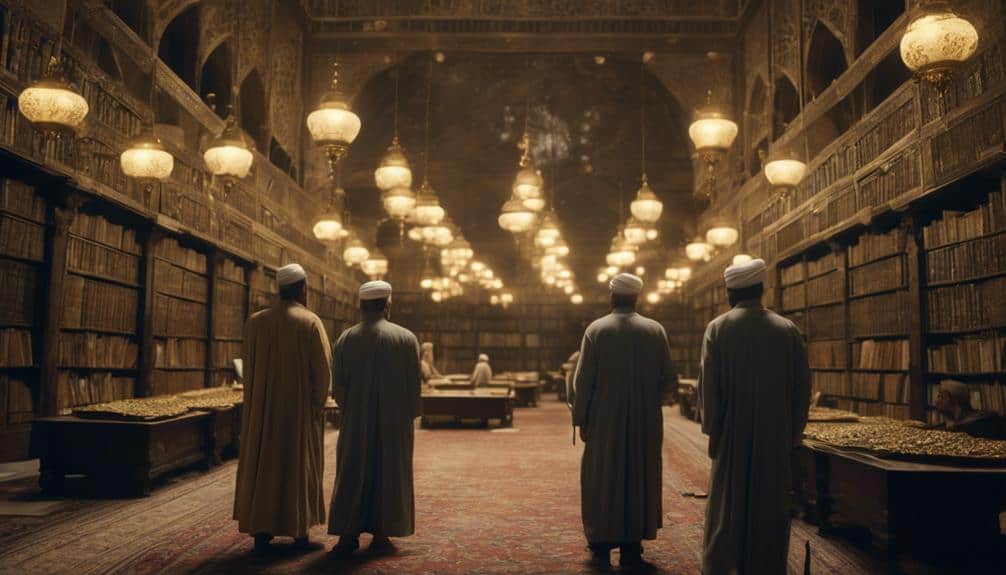
Frequent state funding by caliphs during the Islamic Golden Age played a pivotal role in enabling scholars to preserve and expand upon ancient knowledge. This support was essential in translating and safeguarding texts from various ancient civilizations such as Greece, Persia, and India. By investing in scholars, rulers ensured that the rich heritage of human knowledge wasn't only conserved but also enriched.
- Funding and Resources: Caliphs provided Islamic scholars with the necessary financial backing to undertake their scholarly activities.
- Translation Efforts: State sponsorship facilitated the translation of notable works, making them accessible to a broader audience.
- Libraries and Learning Centers: Establishments like the House of Wisdom in Baghdad were founded due to state support, serving as hubs for knowledge preservation.
- Dissemination of Knowledge: The backing from the state allowed for the widespread distribution of preserved texts, ensuring the longevity of ancient wisdom.
This state funding wasn't merely an act of patronage but a strategic investment in the intellectual and cultural capital of the Islamic world. By empowering scholars, the caliphs played a critical role in the broader endeavor of knowledge preservation, profoundly impacting the continuity and expansion of ancient texts.
Impact on Medieval Science
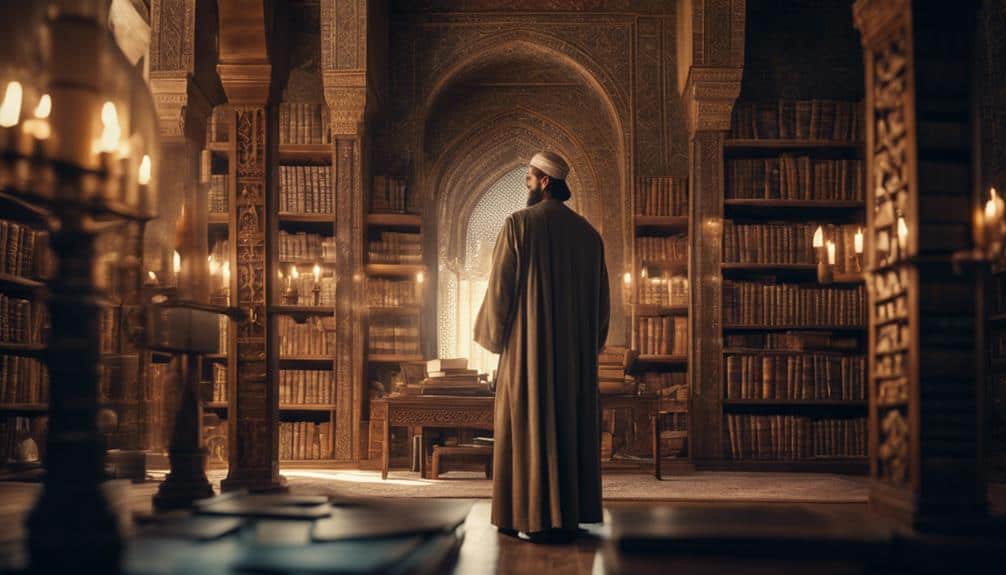
During the Islamic Golden Age, the meticulous preservation and translation of ancient texts by Islamic scholars profoundly influenced the trajectory of medieval science. By translating Greek works and other significant texts into Arabic, these scholars secured the survival of key scientific and philosophical knowledge. Their diligent efforts in knowledge preservation not only protected these texts from being lost to time but also made them accessible to a wider audience.
Islamic scholars established libraries and centers of learning, which became repositories of this ancient wisdom. The works of Aristotle, Euclid, Galen, and other ancient scholars were meticulously copied and recopied, allowing their ideas to flourish. This foundation of preserved knowledge paved the way for significant scientific advancements during the Islamic Golden Age, contributing to fields such as astronomy, medicine, mathematics, and physics.
The impact of these efforts extended beyond the Islamic world. The preserved and expanded knowledge eventually made its way to Europe, jumpstarting the Renaissance and profoundly shaping medieval science. By safeguarding and building upon the ancient texts, Islamic scholars played an essential role in the transmission of scientific ideas, ensuring that critical advancements could continue to evolve across generations and geographies.
Toledo School Collaboration

The collaborative efforts at the Toledo School, where Islamic, Christian, and Jewish scholars worked together, exemplify how intellectual pursuits transcended religious and cultural boundaries to maintain and expand ancient knowledge. This multicultural exchange was pivotal in translating and safeguarding ancient texts, making sure that invaluable knowledge endured across generations and civilizations.
Islamic scholars in Toledo played a vital role in this intellectual synergy. They worked alongside their Christian and Jewish counterparts, setting aside religious differences for the common goal of preserving ancient texts. The Toledo School's environment fostered a unique collaboration that allowed scholars to share and expand their understanding collectively. This cooperation had several key elements:
- Translation Projects: Scholars translated Greek, Arabic, and Hebrew texts into Latin, making them accessible to a broader audience.
- Multilingual Expertise: The scholars' proficiency in multiple languages facilitated accurate and inclusive translations.
- Cultural Exchange: The blending of diverse cultural perspectives enriched the interpretation of ancient knowledge.
- Preservation of Texts: By copying and translating texts, they ensured the survival of critical works that might otherwise have been lost.
Through their collaborative efforts at the Toledo School, these scholars not only preserved ancient knowledge but also laid the groundwork for future intellectual advancements.
Influence on the Renaissance
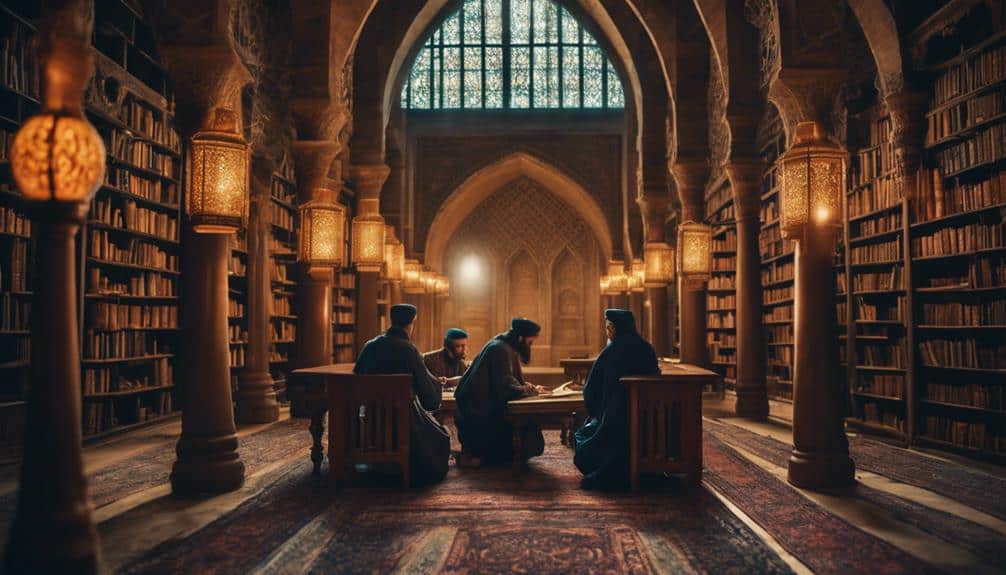
Islamic scholars' meticulous preservation and translation of ancient texts laid an essential intellectual foundation that propelled the Renaissance's scientific and cultural advancements. By translating Greek works, Roman literature, and Persian insights, these scholars created a rich repository of knowledge. This invaluable collection, particularly from the Toledo School, became an intellectual treasure trove for Renaissance scholars like Leonardo da Vinci.
In Toledo, Islamic scholars devoted themselves to the painstaking process of copying and recopying ancient manuscripts. Their dedication guaranteed the survival of key documents that might've otherwise been lost to history. These manuscripts played a critical role in shaping the intellectual landscape of the Renaissance, offering new perspectives and fostering a revival of classical learning.
Renaissance scholars, armed with the translated works of Aristotle, Galen, and Ptolemy, could explore deeper into scientific inquiry and artistic expression. This cross-cultural exchange of knowledge ignited a period of unprecedented growth in various disciplines, from astronomy to anatomy.
Thus, the Renaissance's flourishing owes much to the groundwork laid by Islamic scholars. Their efforts in preserving and disseminating ancient knowledge not only bridged cultural gaps but also illuminated the path for modern scientific and cultural achievements.
Legacy in Modern Science
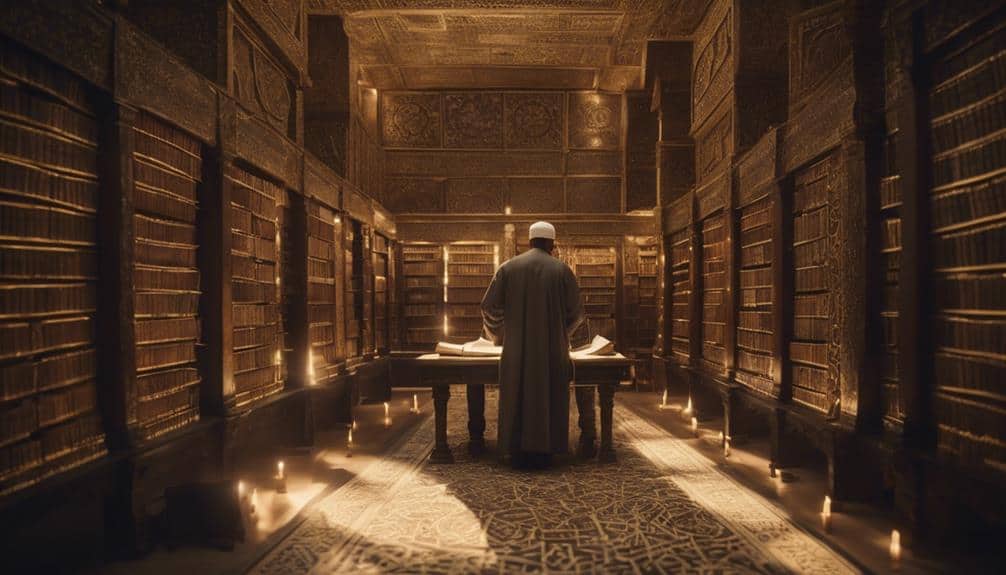
Through centuries of careful preservation and translation of ancient texts, Islamic scholars have left a profound and enduring impact on modern scientific inquiry and research. Their dedication to safeguarding ancient knowledge hasn't only guaranteed its survival but also facilitated significant advancements in various scientific fields.
Consider these key contributions:
- Astronomy: Islamic scholars translated and expanded upon Greek and Indian astronomical texts, leading to improved models of the cosmos.
- Mathematics: The introduction of Arabic numerals and algebra (from the Arabic word 'al-jabr') revolutionized mathematical studies and applications.
- Medicine: Works like Avicenna's 'The Canon of Medicine' became foundational texts in both the Islamic world and medieval Europe.
- Scientific Methods: The empirical approaches and methodologies developed by Islamic scholars laid the groundwork for modern scientific methods.
The impact of Islamic scholars in preserving ancient texts is evident in the terms and concepts used in today's scientific lexicon, many of which have Arabic origins.
Their legacy in modern science isn't merely historical; it actively shapes contemporary scientific inquiry, fostering interdisciplinary research and innovation. By bridging past knowledge with present discoveries, Islamic scholars have guaranteed that ancient wisdom continues to illuminate the path of modern science.


